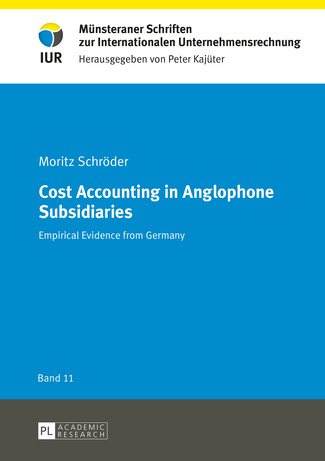Band 11
Moritz Schröder – Cost Accounting in Anglophone Subsidiaries
Empirical Evidence from Germany, Frankfurt a.M. et al. 2014.
 Since the industrialisation in the 19th century, cost accounting has developed into one of the key management accounting instruments. However, remarkable differences in cost accounting practices have emerged across countries, in particular between Anglophone and German firms. Companies from Germany are known for their very detailed and refined cost accounting systems, whereas firms from Anglophone countries such as the USA or UK generally have less complex systems in place. Such national particularities evoke the question how multinational firms design their cost accounting systems. Whereas from a corporate perspective, standardised cost accounting systems seem to be very appealing, foreign subsidiaries may favour their local cost accounting traditions over a corporately induced standard.
Since the industrialisation in the 19th century, cost accounting has developed into one of the key management accounting instruments. However, remarkable differences in cost accounting practices have emerged across countries, in particular between Anglophone and German firms. Companies from Germany are known for their very detailed and refined cost accounting systems, whereas firms from Anglophone countries such as the USA or UK generally have less complex systems in place. Such national particularities evoke the question how multinational firms design their cost accounting systems. Whereas from a corporate perspective, standardised cost accounting systems seem to be very appealing, foreign subsidiaries may favour their local cost accounting traditions over a corporately induced standard.
Even though there is fragmented research on the design of cost accounting systems in international groups, little is known about the actual consequences of cross-national differences of cost accounting for multinationals. This thesis reduces this gap. It analyses cost accounting systems in about 100 small to medium-sized subsidiaries of Anglophone multinationals (esp. US and UK companies) in Germany. The project contains two parts. First, the study investigates the design of cost accounting systems based on a complexity index. Second, the study addresses how local top-managers use the resulting cost information for decision-making. For both analyses, the results from the Anglophone firms are compared to an equally-sized control group of domestic German subsidiaries.
The empirical results reveal that the subsidiaries of Anglophone multinationals in Germany are characterised by Anglophone cost accounting traditions. Their cost accounting systems are significantly less complex than those in the German control group. Among others, personal influences by the management teams in the Anglophone parent companies determine this finding. In addition, the results suggest that the local top-managers in the Anglophone subsidiaries tend to avoid and to defy corporate cost accounting standards more intensively than their counterparts in the domestic German firms. Apparently, the diffusion of cost accounting traditions from a parent company into a foreign subsidiary affects the decision-usefulness of cost information in these subsidiaries.
An analysis of the cost accounting performance underlines this conclusion. The findings show that refined cost centre accounting procedures are a good performance lever for cost accounting in the Anglophone subsidiaries. Curiously, these results contrast the ones from the domestic control group. For these firms, a simplification in cost type accounting practices appears to improve the systems’ performance best. On these grounds, the thesis derives meaningful recommendations for management accounting researchers and practitioners.


